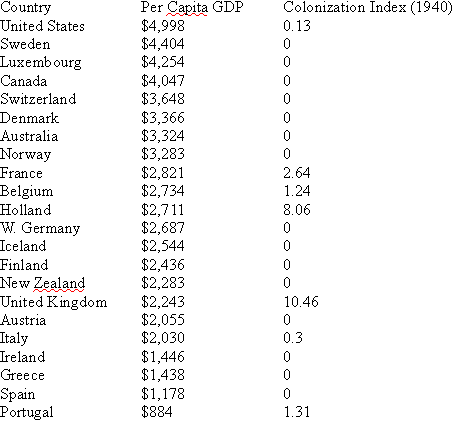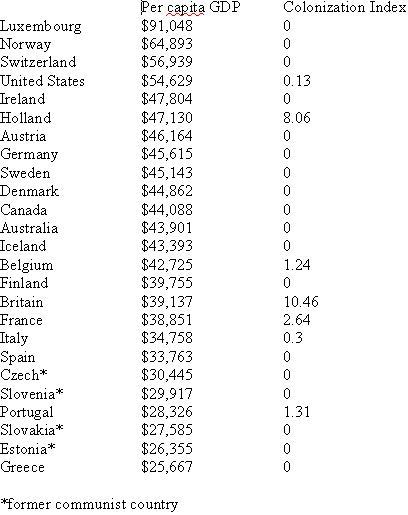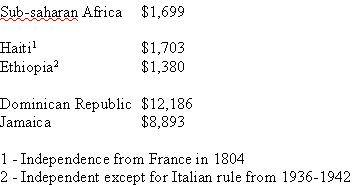Ryan Faulk
The Right Stuff
January 10, 2016
One popular rhetorical attack on white countries is that their wealth is a product of exploiting other countries. Now one way to evaluate this is to look at the “colonized” countries and how they fared.
But the Europeans-as-colonial-exploiters idea has another end of the equation—where the “exploitation” went. If the colonizers are exploiting all this wealth, there should be some wealth on the other end.
I took the population of a country in 1940, and the population of their empires in 1940, and the population of the empire divided by the population of a country is the “colonization index”. An index of 1 would mean there was 1 colonial subject for every citizen. The British empire, at 10.46, had 10.46 colonial subjects for every British citizen.
I then compared their per capita GDPs in 1970 (30 years later). I chose 1970 because it was the earliest year that West Germany appeared on the Wikipedia list of historical nominal per capita GDPs.
The countries I chose to compare to were all non-Communist European countries, “Communist” defined as being in the USSR, the Warsaw Pact, or being Yugoslavia or Albania. If you included Communist countries, sure, you would find that colonizers – all being non-communist – would be wealthier than the average of all European countries. But they’re not wealthier than other non-Communist European countries.
Don’t be limited by me; pick different years if you want. In fact, most of my sources have data for various years.
Colonial vs. Non-Colonial European countries in 1970:
Exactly how much wealth one could extract from a dirt-poor African—if indeed that’s what these countries were doing—seems like it wouldn’t be worth the effort.
Germany, with no empire, was able to drop France, Britain, Belgium and Holland combined in WW2. And in World War 1, Germany was able to almost knock out Belgium and France, who was only saved by the British outside Paris.
Now in WW2 it was a matter of military strategy, not necessarily industrial power, but even in 1939, Germany could produce more of any military equipment than France, and any non-naval military equipment than Britain. And Germany had few colonies in its history relative to its size, and none since 1918. Otto von Bismarck certainly thought colonies were a waste.
From 2013:
At 2013 the story is the same, so it’s not like the “benefits of colonialism” kicked in later. There’s still no relationship between colonialism and wealth, and one of the colonizers – Portugal – is even falling behind some former communist countries.
We can briefly compare the per capita GDP of Sub-Saharan Africa to two racially African countries that were independent since at least 1804 – Haiti and Ethiopia:
Haiti achieved its independence from France in 1804, and 209 years later is as poor as the continent of Africa. Haiti is the smaller of the two countries on the island of Hispaniola.
The Dominican Republic is on the same island as Haiti but is not a racially African majority. Jamaica is a racially African island country in the Caribbean that remained under UK rule until 1962.
Ethiopia evaded any European rule except by Mussolini’s Italy from 1936 to 1942. Ethiopia’s war with Italy and their liberation by Britain killed 290,000 Ethiopians out of a population of 17.7 million, or 1.6% of the population.
By comparison, Japan lost 4.1% of its population, Germany lost 10.46% of its population, Yugoslavia lost 8.8%, the USSR lost 16%, Romania 3.1%, Poland 17%, Italy lost 1.00%, France lost 1.4%, and the United Kingdom 0.9% in World War 2.
To blame Ethiopia’s current economic issues on the effects of that war after 72 years would betray a great ignorance about the history of other countries.
Within Africa, by far the most “colonized” country was South Africa, in terms of proportion of the population that was European. If colonization impoverishes the colonized people, we should expect the blacks in South Africa to be especially poor, but we don’t see that at all:
South African blacks are well above the average for blacks in Africa.
To recap:
- White colonizing countries were no wealthier than non-colonizing white countries—that weren’t Communist. None of the colonizing white countries were Communist. The “colonial exploiter” narrative should predict that these countries should be wealthier than non-colonial white countries that weren’t Communist.
- Black countries that entirely (Haiti) or almost entirely (Ethiopia) escaped colonization were no better off than the rest of Africa.
- The blacks in the most colonized African country – South Africa – are over 3x as wealthy per capita as the blacks in less colonized African countries.
This is not to justify the denial of sovereignty that conquest makes. It is merely to say that the “whites exploited Africa” narrative is probably false.
South Africa numbers:
http://www.pewresearch.org/fact-tank/2013/12/06/chart-of-the-week-how-south-africa-changed-and-didnt-over-mandelas-lifetime/
Per capita GDPs of specific countries:
https://en.wikipedia.org/wiki/ListofcountriesbyGDP(PPP)per_capita
Per capita GDP of black Africa:
http://data.worldbank.org/region/SSA
Historical GDP per capita:
https://en.wikipedia.org/wiki/ListofcountriesbypastandprojectedGDP(nominal)percapita#WorldBankestimatesbetween1960and1969
French Empire:
https://en.wikipedia.org/wiki/Frenchcolonialempire
Portuguese “Empire” population:
http://www.populstat.info/Africa/mozambic.htm
http://www.populstat.info/Africa/angolac.htm
http://www.populstat.info/Asia/easttimc.htm
http://www.populstat.info/Asia/macauc.htm
https://en.wikipedia.org/wiki/Goa#Population
Dutch Empire:
https://en.wikipedia.org/wiki/DutchEastIndies http://www.tradingeconomics.com/indonesia/population
Belgian Empire:
http://www.populstat.info/Africa/congokic.htm
Italian Empire:
https://en.wikipedia.org/wiki/ItalianEastAfrica http://www.populstat.info/Africa/libyac.htm
Populations of European countries in 1939:
https://en.wikipedia.org/wiki/WorldWarII_casualties
 Daily Stormer The Most Censored Publication in History
Daily Stormer The Most Censored Publication in History







